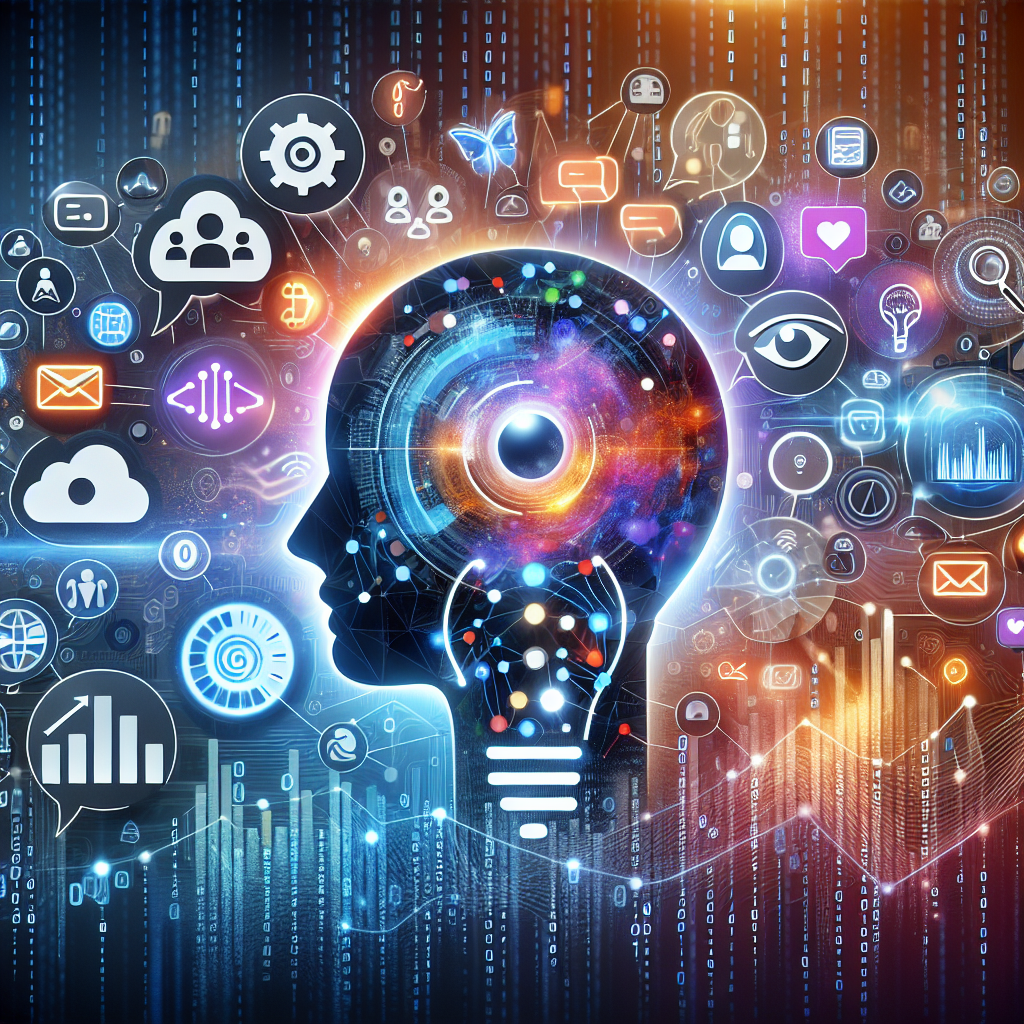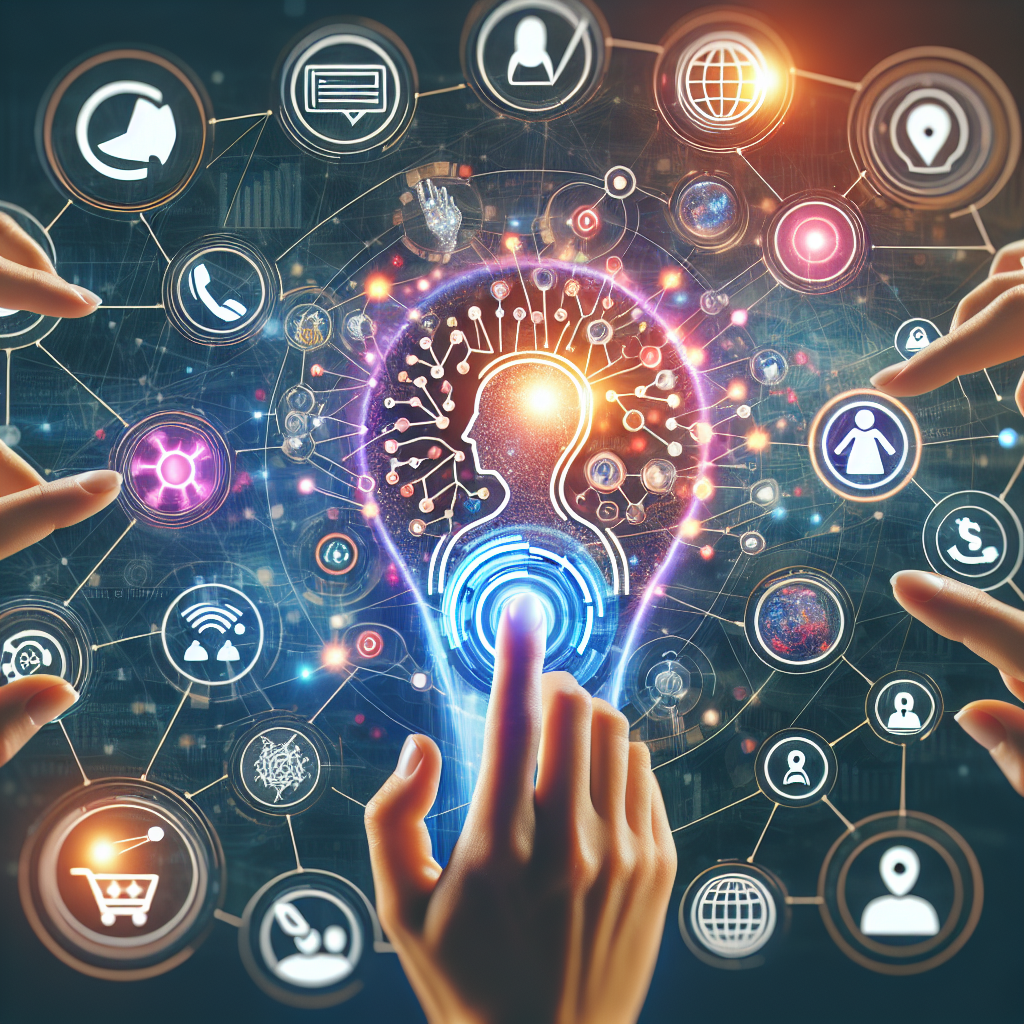Imagine a world where businesses can effortlessly analyze customer behavior, predict future trends, and create personalized marketing campaigns. This is the future of digital marketing, where artificial intelligence (AI) integration is set to revolutionize the way brands connect with their target audience. With AI’s ability to process vast amounts of data, automate tasks, and offer valuable insights, marketers will be equipped with powerful tools to enhance customer experiences and drive business growth. In this article, we will explore the exciting possibilities that AI brings to the world of digital marketing, and how it is reshaping the landscape for businesses of all sizes.

The Role of Artificial Intelligence in Digital Marketing
Artificial intelligence (AI) has emerged as a game-changer in the world of digital marketing. By leveraging the power of machine learning and data analytics, AI is transforming the way businesses connect with their customers, optimize their marketing strategies, and drive growth. From improving customer experience through personalization to revolutionizing chatbots and virtual assistants, AI is reshaping the landscape of digital marketing. In this comprehensive article, we will explore the various roles and benefits of AI in digital marketing, as well as the challenges associated with its integration.
Improving Customer Experience through Personalization
One of the significant contributions of AI to digital marketing is its ability to enhance customer experience through personalization. By analyzing vast amounts of customer data, AI-powered algorithms can understand individual preferences, behaviors, and purchase patterns. This enables marketers to tailor their offerings and messages to each customer, creating a personalized and engaging experience. From personalized product recommendations to targeted emails and customized content, AI-driven personalization can significantly increase customer satisfaction and loyalty.
Enhancing Targeted Advertising
AI is revolutionizing targeted advertising by helping marketers identify and reach the right audience with precision. By analyzing customer demographics, interests, and online behavior patterns, AI algorithms can segment the market and identify micro-targeted audiences. This enables marketers to deliver highly relevant ads to the right people, at the right time, and on the right platforms. As a result, businesses can optimize their ad spend, maximize conversions, and achieve higher return on investment (ROI).
Optimizing SEO Strategies
AI-powered tools and technologies are transforming the way businesses approach search engine optimization (SEO). With advanced natural language processing algorithms, AI can analyze and understand the context, intent, and semantic meaning behind search queries. This allows marketers to optimize their websites and content with relevant keywords, improve their search rankings, and attract organic traffic. Furthermore, AI can also provide insights into user behavior and preferences, enabling marketers to refine their SEO strategies and drive more targeted traffic to their websites.
Automating Data Analysis
Data analysis is a critical component of digital marketing, and AI is making it faster, more efficient, and more accurate than ever before. AI-powered data analytics tools can process large volumes of data in real-time, identify patterns, trends, and correlations, and provide meaningful insights to marketers. This enables businesses to make data-driven decisions, optimize their marketing campaigns, and allocate resources effectively. By automating data analysis, AI frees up valuable time for marketers to focus on strategic initiatives and creative tasks.
Streamlining Content Creation and Curation
Content creation and curation play a crucial role in digital marketing, and AI is streamlining these processes to enhance efficiency and effectiveness. AI-powered tools can generate high-quality content based on specific criteria and objectives, saving marketers time and effort. Additionally, AI can analyze user-generated content, social media posts, and customer feedback to curate relevant and engaging content that resonates with the target audience. By leveraging AI for content creation and curation, marketers can deliver tailored messages that capture the attention of their customers.
Revolutionizing Chatbots and Virtual Assistants
Chatbots and virtual assistants powered by AI are revolutionizing customer service and support in digital marketing. AI-driven chatbots can interact with customers in a natural language, answering their queries, providing recommendations, and offering personalized assistance. These chatbots can handle a high volume of customer inquiries simultaneously, improving response time and customer satisfaction. Virtual assistants like voice-activated devices further enhance the customer experience by providing hands-free and real-time access to information, offers, and services. By harnessing AI for chatbots and virtual assistants, businesses can provide exceptional customer support, drive engagement, and enhance loyalty.
Predicting Customer Behavior and Trends
AI is adept at analyzing customer data and predicting their behavior and trends, enabling businesses to stay one step ahead. By analyzing past purchasing behavior, browsing patterns, and social media activity, AI-powered algorithms can anticipate customer preferences, needs, and desires. This allows marketers to predict upcoming trends, forecast demand, and tailor their offerings to meet customer expectations. By leveraging AI to predict customer behavior, businesses can proactively adapt their marketing strategies, launch targeted campaigns, and gain a competitive edge in the market.
Implementing Predictive Analytics
Predictive analytics powered by AI enables businesses to forecast outcomes and make informed decisions. By analyzing historical customer data, market trends, and external factors, AI algorithms can predict the likelihood of future events or behaviors. This empowers marketers to make accurate predictions about customer engagement, conversions, and revenue potential. By implementing predictive analytics, businesses can optimize their marketing efforts, allocate resources effectively, and achieve higher ROI.
Unlocking Data-Driven Insights
The sheer amount of data available to businesses can be overwhelming, but AI helps unlock valuable insights from this data. Through machine learning algorithms, AI can process and analyze unstructured data, such as text, images, videos, and social media posts. This enables marketers to gain deeper insights into customer sentiments, preferences, and opinions, helping them understand their target audience better. By utilizing AI to extract insights from data, businesses can make data-driven decisions and tailor their marketing strategies to meet customer needs effectively.
Maximizing Social Media Marketing
AI is playing a significant role in maximizing the impact of social media marketing. By leveraging AI-powered tools, businesses can analyze social media data to understand audience behavior, sentiments, and engagement patterns. This allows marketers to refine their social media strategies, create compelling content, and drive meaningful interactions with their customers. AI also enables businesses to automate social media postings, schedule content distribution, and monitor the performance of their social media campaigns. By harnessing AI for social media marketing, businesses can create a strong online presence, build brand loyalty, and drive conversions.
Challenges and Considerations in AI Integration
While the integration of AI in digital marketing brings numerous benefits, it also presents several challenges and considerations that businesses must address. From data privacy and security to ethical implications and customer acceptance, these challenges require careful thought and planning.
Data Privacy and Security
As AI-driven technologies collect and analyze vast amounts of customer data, ensuring data privacy and security becomes paramount. Businesses must implement robust measures to protect customer information, adhere to data protection regulations, and obtain necessary consent for data usage. It is crucial to have stringent data governance policies and secure infrastructure to safeguard customer trust and prevent data breaches.
Ethical Implications
The use of AI in digital marketing raises ethical concerns related to transparency, fairness, and the potential for manipulation. Marketers must ensure that AI algorithms and processes are transparent and accountable, and that the use of AI does not discriminate or propagate bias. It is essential to establish ethical guidelines and frameworks to guide AI usage in digital marketing and maintain ethical standards.
Trust and Transparency
To gain customer trust, it is vital to be transparent about the use of AI in digital marketing. Marketers should clearly communicate how AI is used to enhance customer experience, personalize content, and target advertising. By providing transparency and being open about AI integration, businesses can build trust, alleviate concerns, and foster positive relationships with their customers.
Skill Gap and Workforce Readiness
Integrating AI into digital marketing requires skilled professionals who can develop, deploy, and manage AI-powered tools and technologies. However, there is a significant skill gap in AI expertise, which poses a challenge for businesses. It is crucial to invest in upskilling and reskilling the workforce to ensure readiness and competency in utilizing AI effectively.
Cost of Implementation
Implementing AI in digital marketing can involve considerable costs, including technology investments, training, and infrastructure development. Businesses must carefully assess the cost-effectiveness and ROI potential before integrating AI. Conducting thorough analysis and creating a sound business case are essential to ensure that the benefits outweigh the costs.
Regulatory Compliance
AI integration in digital marketing must comply with various regulations, including data protection, privacy, and consumer rights. Businesses must stay updated with the evolving legal and regulatory landscape and ensure that their AI strategies align with the applicable laws. Adhering to regulatory standards is critical to avoid legal implications and maintain a positive brand image.
Technical Limitations
While AI offers immense potential, it also has certain technical limitations that marketers must consider. AI algorithms may not always produce accurate results, especially in complex and ambiguous situations. Additionally, AI technologies may require substantial computing power and infrastructure to function optimally. Being aware of these limitations helps marketers set realistic expectations and identify areas where AI can be effectively deployed.
Bias and Fairness
AI algorithms are trained on historical data, which may contain inherent biases and inequalities. This can lead to biased outcomes and reinforce existing social or cultural biases. Marketers must actively address biases and ensure fairness in AI algorithms to avoid discrimination or exclusion of certain groups. Regular monitoring and auditing of AI systems are crucial to mitigate bias and ensure fairness.
Customer Acceptance
Integrating AI into digital marketing may face resistance from customers who are concerned about privacy, security, and the use of personal data. To overcome this challenge, businesses must educate their customers about the benefits of AI integration, assuage concerns, and emphasize the value proposition. Transparent communication and respect for customer preferences are key to gaining customer acceptance.
Integration and Infrastructure Challenges
Integrating AI into existing digital marketing systems and processes can present technical challenges. Compatibility issues, data integration, and infrastructural changes may be required to leverage the full potential of AI. Businesses must carefully plan and execute the integration process, ensuring seamless integration and minimal disruption to ongoing operations.

Overcoming Challenges in AI Integration
While the challenges associated with AI integration are significant, businesses can overcome them with proactive measures and strategic planning. Here are some strategies to address the challenges in AI integration:
Investing in Data Security and Privacy Measures
To address data privacy and security concerns, businesses should invest in advanced encryption techniques, secure data storage, and robust access controls. Implementing stringent data protection policies and ensuring compliance with relevant regulations build trust and protect customer data.
Implementing Ethical Guidelines and Frameworks
By establishing ethical guidelines and frameworks for AI usage in digital marketing, businesses can ensure that AI algorithms and processes are fair, transparent, and accountable. Ethical considerations should be at the forefront of AI integration, fostering responsible AI usage and eliminating biases.
Building Trust through Transparency and Explainability
Transparency is key in building customer trust and acceptance of AI. Clearly communicating how AI is used, what data is collected, and how it is used to enhance customer experience creates a sense of transparency. Providing explanations and justifications for AI-driven decisions helps customers understand and appreciate the value of AI.
Upskilling and Reskilling Workforce
The skill gap in AI expertise can be addressed by investing in upskilling and reskilling programs for the workforce. Training and development initiatives should focus on building AI capabilities, data analysis skills, and AI-driven marketing strategies. This ensures that businesses have a competent and capable workforce to leverage the full potential of AI.
Ensuring Cost-Effectiveness through ROI Analysis
Before implementing AI, it is essential to conduct a cost-benefit analysis and evaluate the potential ROI. Businesses must carefully assess the costs involved and compare them with the anticipated benefits and revenue generation. This ensures that the integration of AI is cost-effective and aligns with the overall business objectives.
Adhering to Regulatory Standards and Compliance
Staying updated with regulations and actively monitoring changes in laws related to data security and privacy is essential. Businesses must ensure that their AI integration efforts comply with applicable regulations and industry best practices. Regular audits and reviews of AI systems and practices can help maintain regulatory compliance.
Addressing Technical Limitations through Innovation
While AI has certain technical limitations, ongoing innovation and advancements in AI technology can overcome these challenges. Collaboration with technology partners, staying informed about the latest developments, and embracing cutting-edge AI capabilities can help address technical limitations and drive AI integration success.
Mitigating Bias and Ensuring Fairness
Developing AI systems that are unbiased and fair requires continuous monitoring, auditing, and refinement. Regular assessments of AI algorithms and models can identify and rectify biases. By prioritizing fairness and diversity, businesses can mitigate biases and ensure that AI-driven marketing is inclusive and equitable.
Educating Customers about AI Benefits
To overcome customer resistance and concerns, businesses must educate their customers about the benefits of AI integration. Transparent and proactive communication about the value AI brings, such as personalized experiences, improved customer service, and relevant recommendations, helps customers understand and appreciate the advantages of AI.
Building Scalable AI Infrastructure
To effectively harness the power of AI, businesses must invest in scalable AI infrastructure. This includes robust computing power, scalable data storage solutions, and efficient data processing capabilities. By building a scalable AI infrastructure, businesses can handle large volumes of data and leverage AI to its full potential.

AI-powered Tools and Technologies in Digital Marketing
The integration of AI in digital marketing brings a wide range of tools and technologies that empower marketers to enhance their strategies and outcomes. Here are some of the key AI-powered tools and technologies in digital marketing:
Machine Learning Algorithms
Machine learning algorithms enable computers to learn from and analyze data, identify patterns, and make accurate predictions. In digital marketing, machine learning algorithms are used to personalize content, analyze customer behavior, and optimize marketing campaigns.
Natural Language Processing
Natural Language Processing (NLP) focuses on enabling computers to understand and interpret human language. NLP powers chatbots, virtual assistants, sentiment analysis, and semantic search in digital marketing. By understanding natural language, businesses can communicate with customers more effectively and deliver personalized experiences.
Image and Video Recognition
AI-powered image and video recognition technologies can analyze and interpret visual content. This enables businesses to automatically tag and categorize images, optimize visual content for search engines, and personalize content recommendations. Image and video recognition enhance visual marketing efforts and improve customer engagement.
Data Analytics and Predictive Modeling
AI-driven data analytics tools unlock valuable insights from vast amounts of data, enabling businesses to make data-driven decisions. Predictive modeling uses historical data and AI algorithms to forecast customer behavior, optimize marketing campaigns, and predict future outcomes.
Chatbots and Virtual Assistants
Chatbots and virtual assistants powered by AI enable businesses to provide personalized and efficient customer support. These intelligent agents can handle customer queries, provide recommendations, and assist with transactions, enhancing the overall customer experience.
Marketing Automation
AI-powered marketing automation tools streamline repetitive marketing tasks, such as email marketing, social media scheduling, and lead nurturing. By automating these processes, businesses can save time, improve efficiency, and deliver timely and targeted marketing messages.
Content Generation and Recommendation
AI algorithms can generate high-quality content, including articles, product descriptions, and social media posts, based on specific criteria. Content recommendation engines use AI to analyze user preferences, behavior, and interactions to deliver personalized content suggestions.
Social Listening and Sentiment Analysis
AI-powered social listening tools analyze social media platforms to understand customer sentiments, track brand mentions, and monitor industry trends. Sentiment analysis algorithms interpret customer opinions, enabling businesses to gauge brand perception and identify potential issues.
Customer Segmentation and Targeting
AI algorithms excel at segmenting customers based on demographic, behavioral, and psychographic factors. This allows businesses to target specific customer segments with personalized marketing campaigns, offers, and recommendations.
Optimization and A/B Testing
AI-powered tools can optimize marketing campaigns by continuously analyzing performance data and making data-driven optimizations. Through automated A/B testing, AI algorithms can identify and implement the most effective marketing strategies and tactics.

Emerging Trends and Future Implications
The integration of AI in digital marketing is an ever-evolving field, giving rise to emerging trends and future implications. Here are some of the trends and implications that are shaping the future of AI in digital marketing:
Hyper-personalization and Micro-targeting
Hyper-personalization takes personalization to the next level by delivering highly tailored experiences based on real-time data. Micro-targeting focuses on engaging niche audiences with personalized messages. AI enables businesses to achieve hyper-personalization and micro-targeting by leveraging customer data and AI-driven algorithms.
Voice Search Optimization
The rise of voice-activated devices and virtual assistants has led to an increased emphasis on voice search optimization. AI-powered voice recognition technology enables businesses to optimize their content and websites for voice search queries, enhancing visibility and engagement.
Conversational AI and Voice Assistants
Conversational AI is bridging the gap between businesses and customers by enabling natural language conversations through chatbots and virtual assistants. AI-powered voice assistants, such as Amazon Alexa and Google Assistant, are transforming how customers interact with brands, access information, and make purchases.
Blockchain and AI Integration
The combination of blockchain and AI brings transparency, security, and trust to digital marketing. Blockchain enables secure and transparent transactions, while AI optimizes marketing campaigns and enhances customer experiences. The integration of blockchain and AI has the potential to revolutionize digital marketing processes and build trust in the industry.
AR/VR Experiences in Marketing
Augmented reality (AR) and virtual reality (VR) technologies are increasingly being used to create immersive and interactive brand experiences. AI-powered algorithms enhance AR/VR experiences by analyzing user behavior and preferences to deliver personalized and relevant content.
Emotional AI and Sentiment Analysis
Emotional AI focuses on interpreting and responding to human emotions through facial recognition, tone analysis, and sentiment analysis. By analyzing customer emotions, businesses can tailor their marketing messages and offers to evoke desired emotional responses, creating more impactful and engaging campaigns.
Smart Content and Adaptive Design
AI-powered smart content platforms can automatically adapt and personalize content based on user preferences, location, and contextual factors. Adaptive design uses AI to optimize website layouts and content presentation for different devices, enhancing user experience and engagement.
Quantum Computing in Marketing
Quantum computing holds immense potential for analyzing complex marketing challenges and optimizing decision-making processes. Quantum algorithms can process large amounts of data simultaneously, solving optimization problems and enabling more accurate predictions.
AI-powered Voice and Visual Search
AI-driven voice and visual search technologies enable users to search for products, information, and services using voice commands or images. By optimizing websites and content for voice and visual search, businesses can enhance visibility and reach a wider audience.
Dynamic Pricing and Offer Personalization
AI algorithms enable dynamic pricing by analyzing customer behavior, competitor pricing, and market dynamics. This empowers businesses to optimize pricing strategies and offer personalized discounts, incentives, and promotions based on individual customer profiles and preferences.
In conclusion, the integration of artificial intelligence in digital marketing is transforming the way businesses connect with their customers, optimize their marketing strategies, and drive growth. From improving customer experience through personalization to unlocking data-driven insights, AI is reshaping the landscape of digital marketing. While challenges such as data privacy, ethical considerations, and technical limitations exist, businesses can overcome these hurdles through investment in security measures, adherence to ethical guidelines, and upskilling their workforce. With AI-powered tools and emerging trends, the future of digital marketing holds immense possibilities for hyper-personalization, voice search optimization, conversational AI, and more. As businesses continue to embrace AI integration, they can unlock new opportunities, achieve competitive advantage, and deliver exceptional customer experiences.


